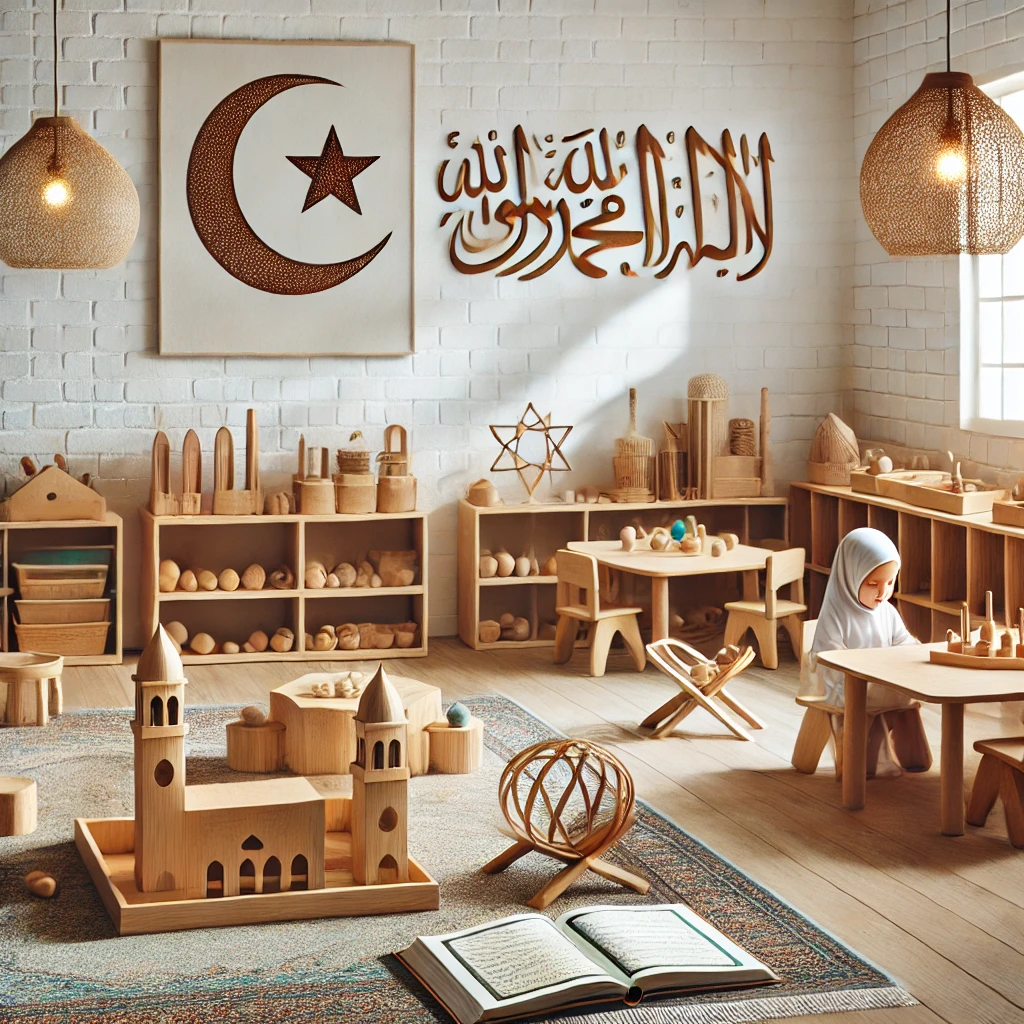
The Montessori method, although developed in a secular context by Maria Montessori, shares many principles compatible with Islamic teachings.
By integrating these two perspectives, educators and parents can provide a rich educational environment that respects Islamic values and supports the holistic development of children.
This article delves into adapting Montessori methods within an Islamic framework.
The Montessori method emphasizes that every child is unique and possesses inherent potential to develop.
Instead of imposing uniform learning, this approach tailors education to the child’s pace, interests, and abilities.
This resonates with Islamic principles, where the child is viewed as an amana (sacred trust) entrusted to parents, who are responsible for nurturing their natural qualities while fostering faith.
A structured and stimulating environment is at the heart of the Montessori method.
The teaching materials are designed to allow children to discover complex concepts through practical experiences.
This environment encourages independent learning, an essential quality for Muslim children, who are guided to assume their religious responsibilities as they grow older.
Maria Montessori introduced educational tools that engage the senses to enhance learning.
In Islam, sensory stimulation is equally valued, such as by repeatedly listening to Quranic verses or observing nature as a sign of Allah’s greatness.
Don’t want to go through the translation anymore?
30 free minutes with your qualified Egyptian teacher.
Islamic Montessori education begins with instilling the fundamental concept of tawhid (the oneness of Allah).
This can be done through activities that showcase the beauty of creation, encouraging children to reflect on Allah’s omnipotence and wisdom.
Examples:
Good manners (adab) and Islamic ethics (akhlâq) are crucial in Muslim education.
These values can be incorporated into Montessori activities that promote cooperation, mutual respect, and kindness.
Examples:
In an Islamic Montessori setting, children gradually learn to perform acts of worship, such as prayer (salât).
A prepared environment could include:
Traditional Montessori tools can be enriched with Islamic elements:
Montessori methods emphasize memorization through sensory activities. In this context:
Nature plays a central role in Montessori education.
In Islam, observing nature is a form of worship, as it reflects Allah’s greatness.
Examples:
One of the goals of Islamic education is to make children independent in their religious practices.
Through the Montessori method, children learn to perform ablution, pray, and recite du’a without constantly relying on adults.
This builds their confidence and strengthens their personal connection with Allah.
In Montessori environments, children are encouraged to choose between various beneficial activities.
In Islam, this practice can be guided by spiritual values, helping children understand the positive consequences of their choices for their faith and morality.
An Islamic Montessori educational environment works best when practices at home mirror those at school.
Examples:
Parents play a crucial role in Islamic Montessori education.
They must not only model exemplary behavior but also actively participate in their child’s learning by reinforcing Islamic teachings.
Children grow up understanding the basics of their faith, such as tawhid, the pillars of Islam, and good manners.
This helps them build a strong connection with their religion from an early age.
The Montessori approach combines intellectual and spiritual education, enabling children to thrive in a balanced manner.
Children become active learners, capable of taking initiative and making thoughtful decisions.
Montessori values of mutual help and respect, integrated with Islamic teachings, encourage children to become responsible members of the community.
Integrating the Montessori method into an Islamic framework offers a comprehensive educational approach, where modern pedagogical principles harmonize with the spiritual teachings of Islam.
By nurturing intellect, independence, and faith, this approach prepares Muslim children to become balanced individuals, spiritually aware and active in their communities.
Parents and educators can adapt these principles at home or in educational institutions, providing children with a stimulating and faith-centered learning environment.
Let me know if you’d like a specific section enhanced further!
To know more: discover our online kids courses
Discover the experiences of our delighted clients who have thoroughly enjoyed utilizing this standout feature.
Alhamdulillah I‘m very pleased with the arabic and Qur’an lessons I receive from teacher Umm Tasneem and I‘m also content with the al-dirassa administration team who were very quick in answering any questions I had. In a month I progressed a lot and I cannot wait to continue my studies with al-dirassa. May Allah reward everyone at al-dirassa.
Verified review - view original
My Qur’an teacher is fantastic, she teaches me in a loving and kind way where I look forward to the lessons and learn so much. My Arabic teacher is equally as nice and has a lot of patience with me, she has great expertise in the field and I’ve progressed really quickly with her. Thank you Al-dirassa!
Verified review - view original

Al-dirassa Institute offers you a gift to help you begin your journey to being fluent in Arabic and learning the Quran.

Al-dirassa Institute offers you a gift to help you begin your journey to being fluent in Arabic and learning the Quran.